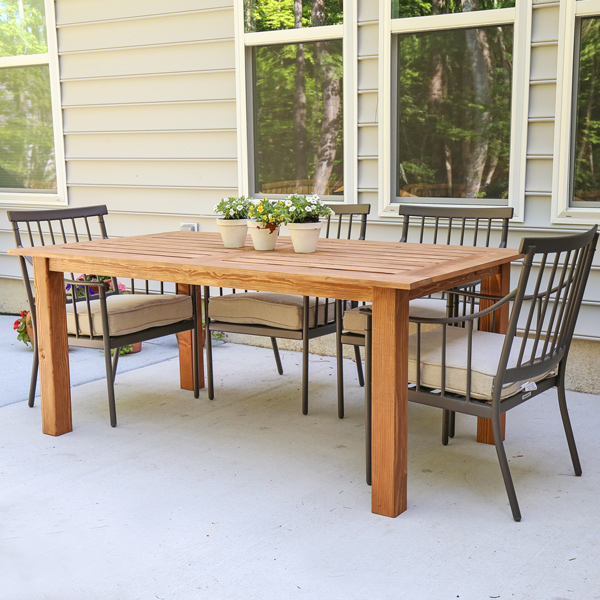Essential Aspects of DIY Wood Patio Tables
Creating your own wooden patio table adds a unique charm to your outdoor living space while allowing you to customize it to fit your style and needs. Whether you're an experienced craftsman or a beginner enthusiast, building a wood patio table requires attention to detail and careful consideration of certain essential aspects, including:
Material Selection
The choice of wood for your table will significantly impact its durability, appearance, and maintenance requirements. Opt for durable hardwoods like teak, mahogany, or cedar that are naturally resistant to moisture and decay. If you prefer a more budget-friendly option, consider pressure-treated pine, which has been infused with chemicals to enhance its resistance to rot and insects.
Table Design
Determine the size and shape of your table based on the available space and the intended use. Consider factors such as table height, tabletop shape, and the number of seats you wish to accommodate. Sketch out your design or browse online for inspiration and ideas to create a table that harmonizes with your outdoor décor.
Joinery Techniques
The strength and stability of your table depend greatly on the joinery methods you employ. Common techniques include mortise and tenon joints, half-lap joints, and pocket hole joinery. Choose a joint type that aligns with your skills and ensures a solid and long-lasting connection between the table parts.
Hardware and Fasteners
Invest in high-quality screws, bolts, and other hardware that are corrosion-resistant and specifically designed for outdoor use. Use stainless steel or galvanized fasteners to prevent rust and ensure a durable connection. Consider adding corner brackets or table braces for enhanced stability, especially for larger or heavy tables.
Finishing and Protection
After assembly, protect your patio table from the elements by applying a suitable finish. Choose a weather-resistant stain or sealant that will enhance the appearance of the wood while providing protection against moisture, UV rays, and wear and tear. Consider re-applying the finish periodically to maintain its effectiveness and extend the lifespan of your table.
Assembly and Placement
Carefully follow the assembly instructions to ensure a sturdy and level table. Use a level to adjust the legs and ensure stability. Place your table in a location that receives adequate sunlight during the day but is shaded from excessive heat during peak hours to prevent damage.
Care and Maintenance
Regular cleaning and maintenance are essential to preserve the beauty and functionality of your wood patio table. Clean it regularly with a mild soap solution and rinse with water. If necessary, use a soft brush to remove dirt or debris from the surface. Avoid harsh chemicals or pressure washing, as they can harm the finish and compromise the integrity of the wood.

Diy Outdoor Table Angela Marie Made
:max_bytes(150000):strip_icc()/cherishedbliss-2fe16e06a68b44589c6631e6b39ae68f.jpg?strip=all)
18 Diy Outdoor Table Plans
:max_bytes(150000):strip_icc()/remodelaholic-b957b7f134eb4281be2bcb3dee084626.jpg?strip=all)
18 Diy Outdoor Table Plans
:max_bytes(150000):strip_icc()/SPR-outdoor-table-plans-5070848-hero-e56542f9054c4a92b888438f5e598fcc.jpg?strip=all)
18 Diy Outdoor Table Plans

Diy Outdoor Patio Table Tutorial Decor And The Dog

Diy Farmhouse Outdoor Patio Table Made With 2 4 S For Less Than 60

Outdoor Dining Table Kreg Tool

Diy X Leg Patio Table With Pipe Trestle Lemon Thistle

Modern Diy Patio Table Effie Row

How To Diy An Outdoor Farmhouse Patio Table
Related Posts







